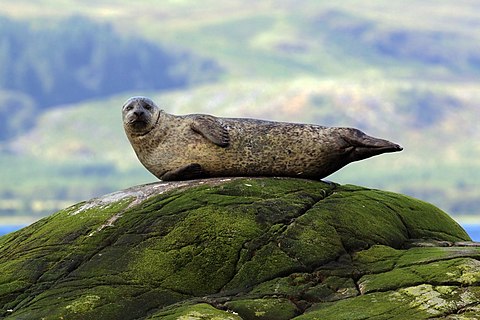The harbour seal (Phoca vitulina), also known as the common seal, is a true seal in the genus Phoca, found along temperate and Arctic marine coastlines in the Northern Hemisphere. The most widely distributed species of pinniped, harbour seals are found in coastal waters of the northern Atlantic and Pacific Oceans and the Baltic and North Seas. They are brown, silvery white, tan or grey, with distinctive V-shaped nostrils. An adult can attain a length of 1.85 m (6.1 ft) and a mass of 168 kg (370 lb). Blubber under the seal's skin helps to maintain body temperature. Harbour seals stick to familiar resting spots or haul-out sites, generally rocky areas, where they are protected from adverse weather conditions and predation, near a foraging area. Males may fight over mates underwater or on land. After a nine-month gestation, females bear a single pup, for which they care alone. Pups can weigh up to 16 kg (35 lb) and are able to swim and dive within hours of birth. They develop quickly on their mothers' fat-rich milk and are weaned after four to six weeks. The global population of harbour seals is 350,000 to 500,000, but subspecies in certain habitats are threatened.
This picture, taken in 2015, shows a harbour seal off the island of Lismore in Scotland.Photograph credit: Charles J. Sharp
